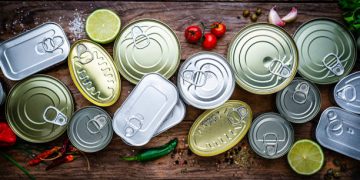by supplychainreport
Newly implemented tariffs on imported steel and aluminum are prompting concerns among food industry leaders, anti-hunger advocates, and economic experts who warn that the cost of canned foods could rise significantly in the coming months.
Effective June 4, the 50% tariff on certain metals may increase the cost of items packaged in steel cans—such as tuna, beans, soups, and fruit—by as much as 15%, according to industry estimates. This could pose particular challenges for low-income households that depend on affordable, shelf-stable foods and participate in nutrition assistance programs like the Supplemental Nutrition Assistance Program (SNAP).
Cale Johnson, a 20-year-old student in Omaha, Nebraska, works two part-time jobs while attending college full-time. Canned foods form the core of his daily diet due to their affordability and long shelf life. Johnson says the prospect of price increases is leading many in his community to stock up now, fearing reduced affordability in the near future.
Industry groups have expressed concern that the tariffs will add strain to an already burdened food supply chain. The Can Manufacturers Institute (CMI) noted that American can makers import nearly 80% of tin mill steel—a key material for canned food production. Domestic production has declined sharply in recent years, leaving only three operating tin mill lines in the U.S.
“The tariffs are a food security issue,” said Scott Breen, president of CMI. “We want to be able to manufacture cans here and fill them with food grown in the U.S. The tariffs create an unnecessary cost that someone has to bear: the can maker, the retailer, the brand, and ultimately the consumer.”
Meanwhile, the food industry and hunger relief organizations are also monitoring potential reductions in SNAP benefits. A budget proposal currently under review includes cuts to the program, which currently provides an average of about $6 per day per recipient.
“With grocery prices rising and SNAP benefits potentially shrinking, families across the country will have fewer resources to meet even their basic needs,” said Gina Plata-Nino, deputy director at the Food Research & Action Center (FRAC). “We are likely to see an increase in food insecurity, housing instability, and difficult financial choices.”
Michelle Orge, executive director of Second Harvest Foodbank of Southern Wisconsin, said increased costs could limit the volume and variety of non-perishable foods her organization is able to distribute. Donations may also decline, she noted, if the cost of canned goods rises for consumers.
Executives from several major food producers—including Del Monte, Goya Foods, Bush’s Beans, and Hormel Foods—have advocated for targeted tariff exemptions on materials imported from allied countries. However, it remains unclear whether relief will be granted.
The Aluminum Association also raised concerns, stating that the tariffs could “undermine” the domestic industry they are intended to support.
Experts warn the combined effects of higher metal tariffs and reduced food assistance could heighten challenges for millions of Americans.
“Hunger could worsen substantially if these policies remain in place,” said Parke Wilde, a food economist at Tufts University. “This represents a major contraction in the country’s hunger safety net.”
#SupplyChainNews #FoodSecurity #TariffImpact #CannedFoodPrices #USFoodPolicy















